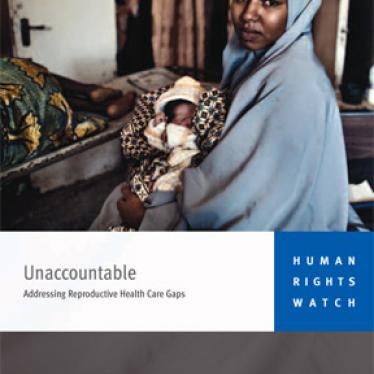(London) – Sexual and reproductive health and rights should be at the center of all efforts to meet reproductive health needs, including family planning, Human Rights Watch said today in a joint letter with Amnesty International, the Center for Reproductive Rights, and over 300 signatories. The summit is set to take place July 11, 2012, in London.
According to the organizers, which include the UK government and The Bill and Melinda Gates Foundation, the aim of the Family Planning Summit is to commit the global community to giving access to family planning to 120 million more women in the poorest countries by 2020.
“Around the globe today, women’s and girls’ lives are at risk because they are denied basic reproductive rights,” said Liesl Gerntholtz, women’s rights director at Human Rights Watch. “They are refused information about family planning, they are forced to carry pregnancies, give birth in dangerous circumstances, and in many places, women are still sterilized without their informed consent or even knowledge. The family planning summit should tackle these harsh realities head on.”
The family planning summit in July should give women’s and girls’ human rights a central role, the organizations said. Among other rights, women and girls have the right to decide when and whether to have children, and to access the information, health services, and resources to exercise this right. The summit should ensure quality of care, the facilitation and support of meaningful participation of all women – including adolescents, women from racial and other minorities, and women with disabilities – in the design and implementation of family planning programs, and a system for monitoring, evaluation, and accountability to track and measure impact.
The family planning summit is being co-hosted by the UK government and the Gates Foundation, with the UN Population Fund supporting the initiative. The poorest countries envisioned for support in this imitative are a group of 69 countries with a Gross National Income of $2,500 per year or less, based on the World Bank 2010 classification.
The organizers state they aim to assist a total of 380 million women by 2020 with family planning to enable them to delay, space, or limit their births. This figure, the organizers say, would mean an increase of 120 million on the estimated 260 million women who currently have access to family planning, whose access they plan to sustain.
Human Rights Watch has documented the wide range of human rights abuses women and girls face throughout their lifetime that affect their sexual and reproductive health, in Asia, Latin America, Africa, the US, and Europe. These abuses include, for example, discrimination against marginalized communities in access to care, mistreatment by health workers, denial of information on HIV and family planning, and failure to obtain informed consent for services offered.
Human Rights Watch has also documented the impact of poor monitoring and oversight, including the failure to provide women with effective mechanisms to air their grievances and seek redress for human rights abuses and others barriers they face in accessing sexual and reproductive healthcare.
“The expected injection of more money and attention to family planning presents a great opportunity to improve the lives of women and girls, but with it comes great responsibility,” said Gerntholtz. “Without accountability and a focus on rights, the money may not reach those who need it the most – and could even inadvertently cause harm.”







